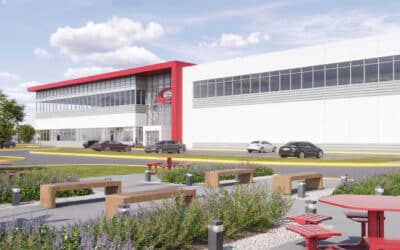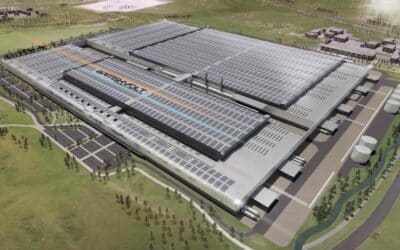They might look like nothing more than giant sheds tucked away on industrial estates – but inside these huge data centres a new industrial revolution is quietly taking shape.
Data centres, once dismissed as dull infrastructure, are now being hailed as the North’s secret weapon in the race to become a UK powerhouse for artificial intelligence. Prolific North attended the the Data Centre Summit in Manchester this week as part of our deep dive into the future of Northern tech, where civic and industry leaders made the case for why the North West should be at the heart of the government’s AI Growth Zone strategy.
They say it has the potential to unlock tens of billions in economic growth and create thousands of high-value jobs in the region.
READ MORE: Northern tech firms consider moves to US as funding frustrations mount in the UK
“These aren’t just big sheds with racks, they’re the foundation for a new revolution,” said Steve Rotheram, Mayor of the Liverpool City Region, who joined calls for the government to take the North seriously as a global AI hub.
The summit heard how scaling up the UK’s data centre capacity by just 5% a year could pump an extra £44 billion into the economy by 2035, alongside nearly 60,000 jobs and almost £10bn in extra tax revenue, according to estimates from a TechUK report.
Hailing data centres as “critical infrastructure”, these facilities will become the “engine rooms of the digital economy,” bringing significant jobs and local investment across the North.
READ MORE: Join our GRAFT event on 21 May, as part of our Digital City Festival
Following the release of the government’s AI Opportunities Action Plan in January, one of the recommendations was to create AI Growth Zones with the first revealed to be in an Oxfordshire village in Culham. Although there was no mention of the North at the time, the government opened up bids to local and regional authorities across the UK for a further four zones.
“The North West is uniquely placed to lead this revolution with a significant ecosystem,” explained Rotheram, referencing how global players such as infrastructure services provider Kyndryl have opted to invest in the Liverpool City Region and pledged up to 1,000 jobs.
READ MORE: How Northern tech is “grafting” its way to the top with global ambitions
From a pool of highly skilled graduates to the LCR Connect project with a 214km gigabit-capable, full-fibre network, he highlighted the readiness and continuing partnership between Greater Manchester and the Liverpool City Region to equip the North West with the investment, capacity and connectivity to become one of those zones.
“We’re ready to work with government, data operators, innovators and investors to create a hub here in the North West that will be recognised globally for its computing power, its commitment to net zero and its people-first approach to innovation.
“We were in the heart of the first industrial revolution. Liverpool was the gateway and Manchester and Lancashire were at the very epicentre of it. So we’re superbly positioned to be at the centre of this next revolution.”
With a new £350m data centre under development in Stockport, Kao Data also launched a new report examining why the North West region is a prime location for a new AI growth zone to coincide with the Summit.
Spencer Lamb, CCO at Kao Data, explained why the UK needs to diversify its critical infrastructure to new hubs like Greater Manchester as the UK’s “largest” AI ecosystem outside of London.
Despite over 500 data centres based across the UK, most are currently concentrated around West London. With a potential shortage of power in the West London and Slough area, data centres “should be taken seriously” and the North West is primed as a “serious contender” with the opportunity to scale as a new data centre hub.
Kao Data is now looking to “double the capacity” of its Stockport development and plans to look at other locations across the North West too.
The AI Growth Zone initiative, with only five designated zones so far, sparked debate during a panel session that addressed how data centres in the North can foster local economic growth and innovation. Henri Murison, chief executive officer at The Northern Powerhouse Partnership, said data centres are not the “be all and end all of the opportunity” and questioned why the zones are limited to five locations across the UK as growth zones “should be where we need them”.
Mark Yeeles, vice president – secure power division at Schneider Electric, said data centres can fuel “growth” but there needs to be a clear pathway on the type of skills needed – it’s not just about AI skills as the “real need” is for plumbers and electricians to build.
Greater Manchester has a “significant AI cluster” with over 300 companies leading the way from the likes of Peak and Matillion, added Elizabeth Scott MBE, executive director at Turing Innovation Catalyst Manchester. The region “needs to keep building” on its strong foundations and data centres are a “key part of that picture”.
Beyond the North West, there are plenty of other plans for expansive data centre hubs in the works from Blackpool’s data centre campus ‘Silicon Sands’, Blackstone’s development on the former Britishvolt site, to Microsoft’s £106.6m acquisition of a former power station in Leeds to create a hyperscale data centre.
As for when the next AI Growth Zones will be announced, it’s expected the government will reveal the next four by the summer period.














